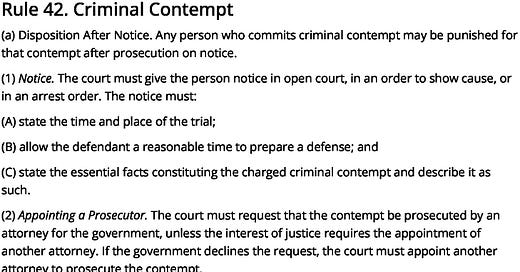Bonus 143: Private Special Prosecutors and Criminal Contempt of Court
The Alien Enemy Act case may end up with Chief Judge Boasberg appointing a private lawyer to prosecute criminal contempt of court. The law currently allows such a move, but I believe it shouldn't.
Welcome back to the weekly bonus content for “One First.” Although Monday’s regular newsletter (and unscheduled issues) will remain free for as long as I’m able to do this, I put much of Thursday’s bonus content behind a paywall as an added incentive for those who are willing and able to support the work that goes into putting this newsletter together every week. I’m grateful to those of you who are already paid subscribers, and I hope that those of you who aren’t will consider a paid subscription if and when your circumstances permit.
I wanted to use today’s bonus issue to write about what seems to be the increasingly likely denouement of the J.G.G. Alien Enemy Act case—in which Chief Judge Boasberg issued a 46-page ruling yesterday concluding that there is “probable cause” to believe that government officials willfully defied his earlier rulings and thereby committed contempt of court when, purporting to act under the Alien Enemy Act of 1798, they removed multiple planeloads of non-citizens to El Salvador back on March 15. Boasberg’s opinion is worth reading in its entirety; it is calm, methodical, and, to my mind, unanswerable. (It’s also not appealable since it doesn’t actually hold anyone in contempt, but that hasn’t stopped DOJ from trying.)
The tricky part is the conclusion of Boasberg’s analysis, which sets out the next steps. As Boasberg explains, the government can “purge” its contempt by providing the folks who were wrongfully removed with the process of which they were deprived (and which the Supreme Court has ruled is required under the Alien Enemy Act). And when (not if) the government declines to do so, Boasberg intends to take testimony to identify exactly who was responsible for the contempt—and to refer them to the U.S. Attorney for a criminal prosecution that … will never happen. But as Boasberg notes, Rule 42(a)(2) of the Federal Rules of Criminal Procedure specifically contemplates the possibility of such a prosecutorial declination, at which point the district court shall “appoint another attorney to prosecute the contempt,” i.e., a private special prosecutor:
There’s just one small problem: Insofar as it authorizes such an appointment, Rule 42(a)(2) is almost certainly unconstitutional under the Supreme Court’s current separation-of-powers jurisprudence. And current doctrine aside, I think that it’s also inconsistent with more fundamental separation-of-powers principles. I sympathize, deeply, with the idea that the government’s behavior in J.G.G. demands a remedy. But there are compelling reasons, grounded in other fact patterns, for why we should be wary of giving even the most principled and responsible federal judges the power to override DOJ decisions to not prosecute criminal contempts of court. I realize that this viewpoint will strike at least some readers the wrong way, especially at this moment and/or in this case. But especially as the proper scope of judicial power becomes more important by the day hour, it seems no less important to also articulate the proper limits on that power, too.
For those who are not paid subscribers, we’ll be back on Monday (if not sooner) with our regular coverage of the Court. For those who are, please read on.
Keep reading with a 7-day free trial
Subscribe to One First to keep reading this post and get 7 days of free access to the full post archives.




